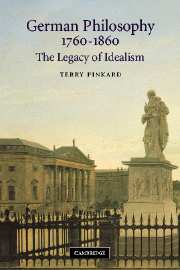Book contents
- Frontmatter
- Contents
- Acknowledgements
- List of abbreviations
- Introduction: “Germany” and German philosophy
- PART I KANT AND THE REVOLUTION IN PHILOSOPHY
- 1 The revolution in philosophy (I): human spontaneity and the natural order
- 2 The revolution in philosophy (II): autonomy and the moral order
- 3 The revolution in philosophy (III): aesthetic taste, teleology, and the world order
- PART II THE REVOLUTION CONTINUED: POST-KANTIANS
- PART III THE REVOLUTION COMPLETED? HEGEL
- PART IV THE REVOLUTION IN QUESTION
- Conclusion: the legacy of idealism
- Bibliography
- Index
3 - The revolution in philosophy (III): aesthetic taste, teleology, and the world order
Published online by Cambridge University Press: 05 June 2012
- Frontmatter
- Contents
- Acknowledgements
- List of abbreviations
- Introduction: “Germany” and German philosophy
- PART I KANT AND THE REVOLUTION IN PHILOSOPHY
- 1 The revolution in philosophy (I): human spontaneity and the natural order
- 2 The revolution in philosophy (II): autonomy and the moral order
- 3 The revolution in philosophy (III): aesthetic taste, teleology, and the world order
- PART II THE REVOLUTION CONTINUED: POST-KANTIANS
- PART III THE REVOLUTION COMPLETED? HEGEL
- PART IV THE REVOLUTION IN QUESTION
- Conclusion: the legacy of idealism
- Bibliography
- Index
Summary
THE NATURAL AND THE MORAL ORDERS
In the picture of the mind's relation to the world that emerged in Kant's first two Critiques and his other works, there was in our general experiential engagement with the world a necessary element of spontaneity on the part of the mind in apprehending objects of experience; this spontaneity was both underived and involved neither an apprehension of any given object nor any self-evident first principle. Instead, its spontaneous character indicated the way in which it, as it were, sprang up by its powers. In such spontaneity, the human agent produced the “rules” by which the “intuitions” of our experience were combined into the meaningful whole of human experience; without the rules being combined with such experiential, intuitional elements, the results of such spontaneity were devoid of significance (Bedeutung), in the sense that they were devoid of any objective relation to the world. When transferred to the moral realm, though, such spontaneity was no longer chained to intuition for its significance, and, in relation to action, spontaneity became autonomy, the capacity to institute the moral law and to move ourselves to action by virtue of having so instituted it.
There had long been a tradition in philosophical thought that held that our individual perceptions of things and our deliberations about what to do required us to have some conception of our own standing in the overall scheme of things.
- Type
- Chapter
- Information
- German Philosophy 1760–1860The Legacy of Idealism, pp. 66 - 80Publisher: Cambridge University PressPrint publication year: 2002

